Are you prepared for the winter?
Hotels increasingly have turned away from bathtubs and toward showers. This shift means every guest expects a hot shower—fast. And with winter just around the corner, this demand will only increase.
So today, I discuss water heaters and answer your questions about selecting the most efficient water heater for your project.
![]()
Contents:
![]()
- There are four basic types of commercial water heaters: tank-storage, hybrid, tank-less, and point-of-use.
- Tank-storage heaters are by far the most popular kind, but tankless water heaters are growing exponentially each year.
- Hybrid models are relatively new but worth considering if you’re seeking maximum energy efficiency.
- Point-of-use heaters are ideal for quickly delivering hot water to faucets and appliances located far from the hotel’s main water heater.
Many use the term “boiler” for any big apparatus that heats water. However, a boiler is not a water heater, nor vice-versa.
At its most basic level, a water heater is designed to heat the supply of water within your hotel. Water starts its journey at the top of your water heater and is then funneled to the bottom of the heater so it can be – you guessed it – heated! and then supplied, wherever required through supply pipes.
A boiler, on the other hand, does more than just heat water; it actually boils the water and then turns it into steam. Once the water is heated and turned into steam, it comes out of the boiler and can be used in a variety of ways, including central heating through radiant heating, water heating, cleaning carpets, cooking, cleaning, and sanitation.
The key takeaway here is that a water heater stores water until it is needed in a certain area of the hotel, while a boiler does not store water—it simply heats water as the water passes through the tubes.
In the Uniform Plumbing Code, water heaters—fuel-gas burning, oil burning, and electric, all of which heat potable water are regulated by the provisions in Chapter 5. These appliances should not be confused with boilers, which are regulated by the Uniform Mechanical Code.
A water boiler is considered to be a “pressure vessel,” and it must be constructed in compliance with the American Society of Mechanical Engineers and National Board standards, which are considerably more stringent than those applicable to water heaters.
A water-heating device that exceeds any one of the following should be classified as a water boiler, which steps up to a new set of design and construction standards:
- 120 gallons (454.2 liters) nominal water storage capacity;
- 160 psi (1103.2 kPa) operating pressure;
- 210 degrees Fahrenheit (99 degrees Celsius) operating temperature; or
- 200,000 Btu/hr. (58,620 kW) heat input.
Tank-storage and Tankless Water Heaters
A vast majority of hotels have conventional tank-storage water heaters, which are powered by gas.
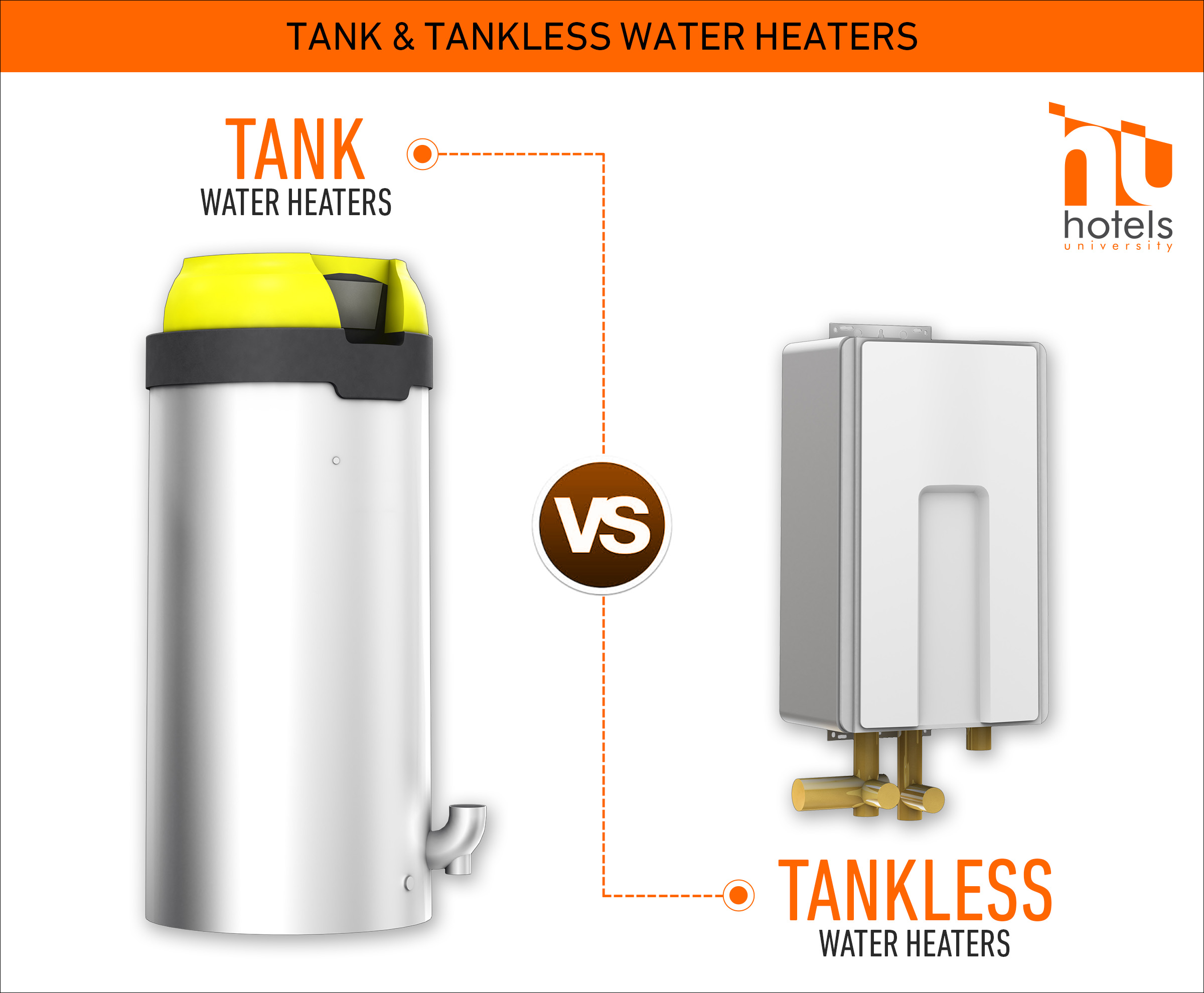
The Tank-storage Water Heater
As its name implies, a tank-storage heater has a large insulated storage tank that holds hot water until it’s needed.
- Pros
- Is less expensive than tankless systems
- Can be cheaper to repair and maintain
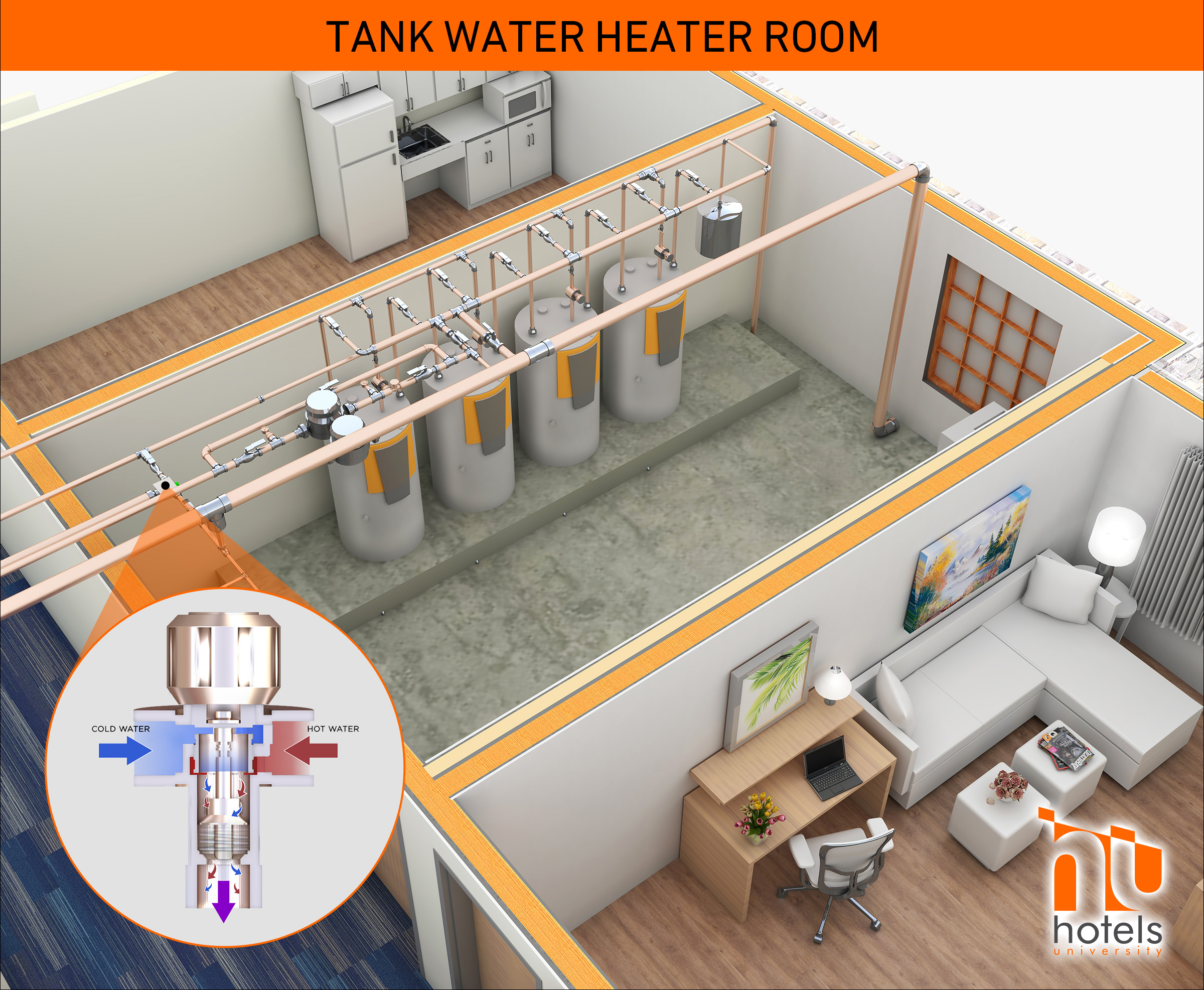
- Cons
- Consumes more energy, causing higher power bills
- Is larger than its counterparts, requiring more space
- Tanks require a thermostatic mixing valve
- Has limited storage capacity, making it difficult to meet high demand
Tankless Water Heater
- It is a closely-packed, wall-hung system that can provide hot water for the entire hotel. It is often called an instantaneous or on-demand water heater.
- The water is instantly heated when called for by turning on a hot water tap or activating an appliance that requires hot water. And as you may have guessed, this type of water heater has no bulky storage tank.
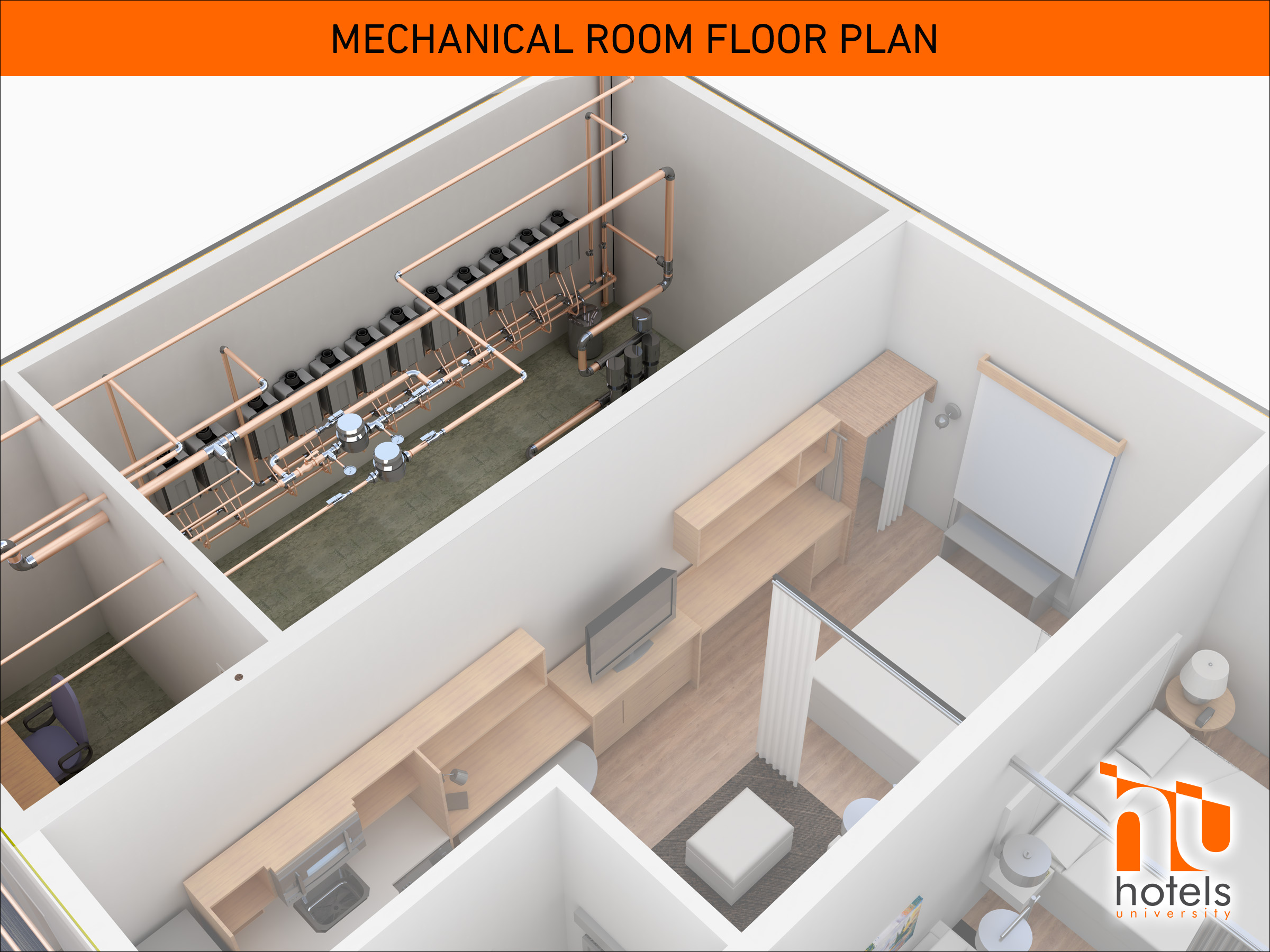
- Pros
- Uses less energy as it only heats water when the fixture demands
- Is more compact than a storage tank system
- Effectively prevents the risk of Legionella disease outbreak
- Comes with an extended lifespan of more than 20 years 1
- Meets peak demand, conserves energy, and reduces the hotel’s carbon footprint
- Doesn’t require a thermostatic mixing valve
- Cons
- Larger versions that can supply for the whole hotel cost more than a tanked water heater
- Installation requires professional skills
- A threat endangers those who use both residential and commercial tank heaters: Legionnaires’ disease.
Legionnaires’ disease is a body of diseases –all caused by the same bacteria called Legionella. This pathogen grows in still warm water. If inhaled through water vapor, these bacteria could cause fever, pneumonia, comas and even death. - Fiddling with hot water tank temperatures for energy efficiency gains could set off a chain reaction producing Legionella.
- Many energy experts, including the U.S. Department of Energy, recommend setting hot water tanks to 120 degrees Fahrenheit to shave a few bucks off the gas bill.
- Unfortunately, Legionella can survive that temperature and prosper. OSHA recommends keeping tanks at 140 degrees, which effectively neutralizes Legionella-infected water, but hot water at that temperature could easily scald children or seniors with sensitive skin.
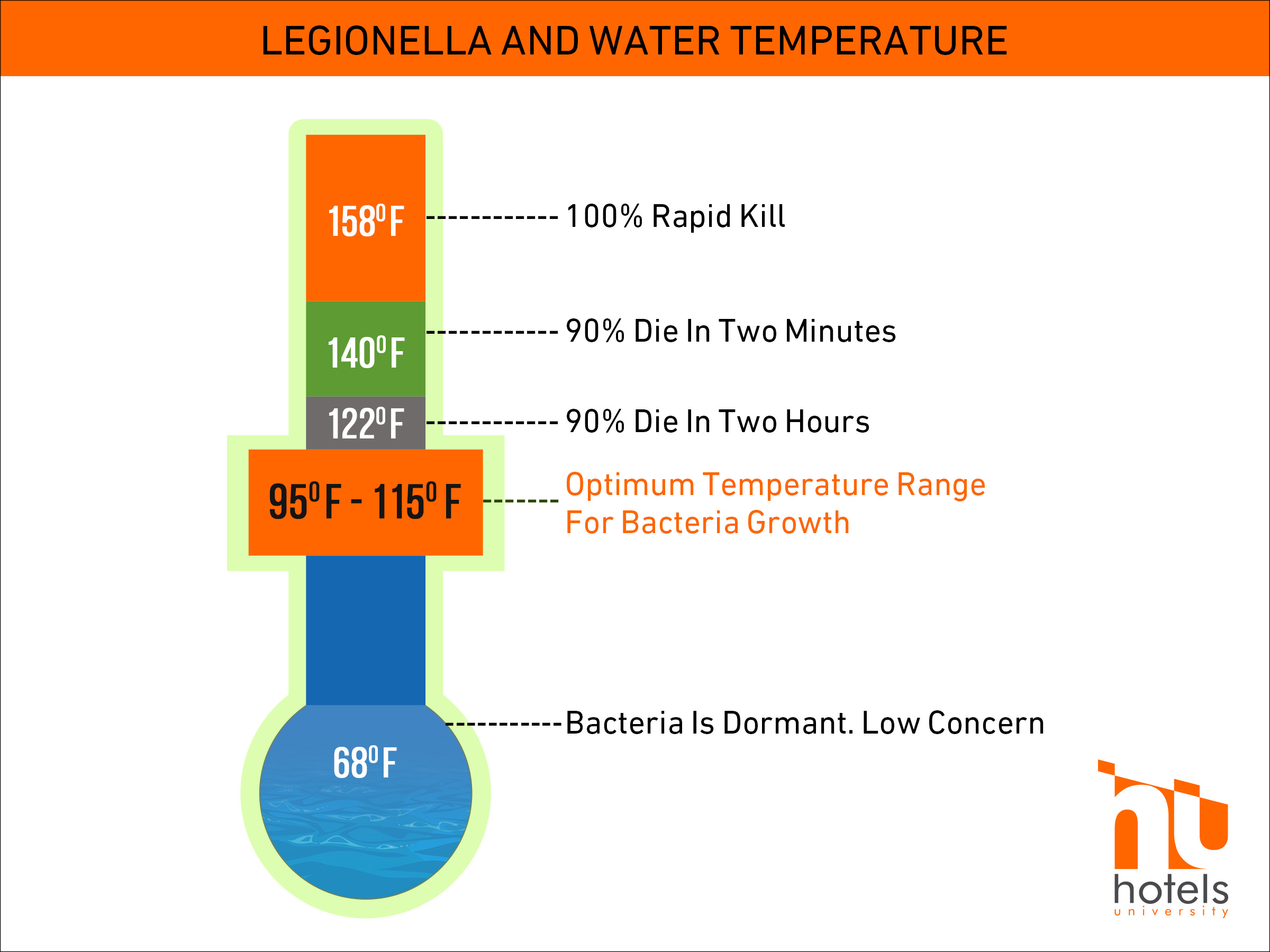
- Legionella also breeds in pipes where stagnant hot water cools below that 120-degree mark. As hot water trapped between a water tank to a faucet or tap cools, it becomes more and more susceptible to infection.
- Tankless water heaters instantaneously heat water using advanced flow control. This keeps a constant water flow (moving water as opposed to stored), which drastically reduces the risk of bacterial growth. 2
- Tempering or mixing valve in tank-storage systems helps set acceptable water temperature ranges. These valves blend cold water with hot water (with high enough temperature to kill bacteria), which minimizes the risk of scalding as well as Legionella.2
- Point-of-use tankless water heaters not only forego the large cylindrical basin where Legionella can grow but also reduce the piping needed to deliver water from a utility to the faucet, thus eliminating another threat. Water moves directly from the public system, into the hotel and right to the tap where it’s heated on demand.
- Other attempts to minimize Legionella risk have led to overly complex and expensive solutions that rely on regular water treatment or additional heating, increasing the operating costs. By removing the storage aspect, tankless water heaters reduce the need for maintenance and other expensive interventions.
Different hotel brands prefer different types of water heaters suiting their design and project requirements. Tank-storage and tankless water heaters are the most popular options hotel developers go with.
These are some of the leading water heater brands available in the market today.

- Marriott prefers instantaneous water heaters as the brand standard. Hilton, IHG, and Hyatt do not have any specific preferences.
In a typical situation, you should expect your water heater to last about ten years. The type of water heater is not the best predictor of its lifespan. Instead, your use and maintenance will tell a much better story.
A failed water heater is more than just a disruption; it can sometimes lead to major damage to your property. The good news is that most water heaters will start letting you know it’s time for service before a catastrophe happens.
The number one enemy of any water heater is hard and/or corrosive water. Water quality across the country varies dramatically, but the poorer the water quality in an area, the shorter the service life a water heater will have.
Water softeners are needed in nearly 80% of hotels to treat hard water. Hard water—when left untreated—can clog plumbing systems with limescale and reduce the lifespan of the plumbing equipment and fixtures. Dive into its basics here.
These signs indicate that it’s time to replace or repair the water heating system:
- Age: In most cases, when your water heater reaches the ripe old age of ten, it’s time to start keeping a close watch. If you’re not sure how old yours is, check the rating plate–or the big sticker with details of your unit.
- Rusty Water: If the hot water coming from your faucets is rusty, this could be a problem with the water heater tank. If rust also shows up in cold water, then it’s likely coming from your pipes instead.
- Noise: Loud rumbling, banging or knocking are the signs that your water heater needs a repair or replacement. Keep in mind that quiet ticking and other small noises are normal–you’re listening for something new and loud.
Ultimately, it comes down to individual circumstances and choices. Some important factors to consider when choosing a boiler or a hot water heater are:
- How is the climate?
- How much room do you have to store it?
- How many people will be using your system’s water supply?
- Do you need on-demand access to hot water?
One constant is that, with proper care and maintenance, whatever hot water heating system you choose can typically last between 10 and 20 years.
Water heaters can be a costly investment for hotel owners that you’ll be dealing with for over a decade. That’s why when it’s time to equip your new hotel or replace your old water heater it’s important to consider the cost, efficiency, and longevity of your new water heater.
If you have any questions about designing a hot water system in your hotel, feel free to reach out!
Thank you,
Blair Hildahl
Blair@hotelsuniversity.com
608.304.5228
Sources:


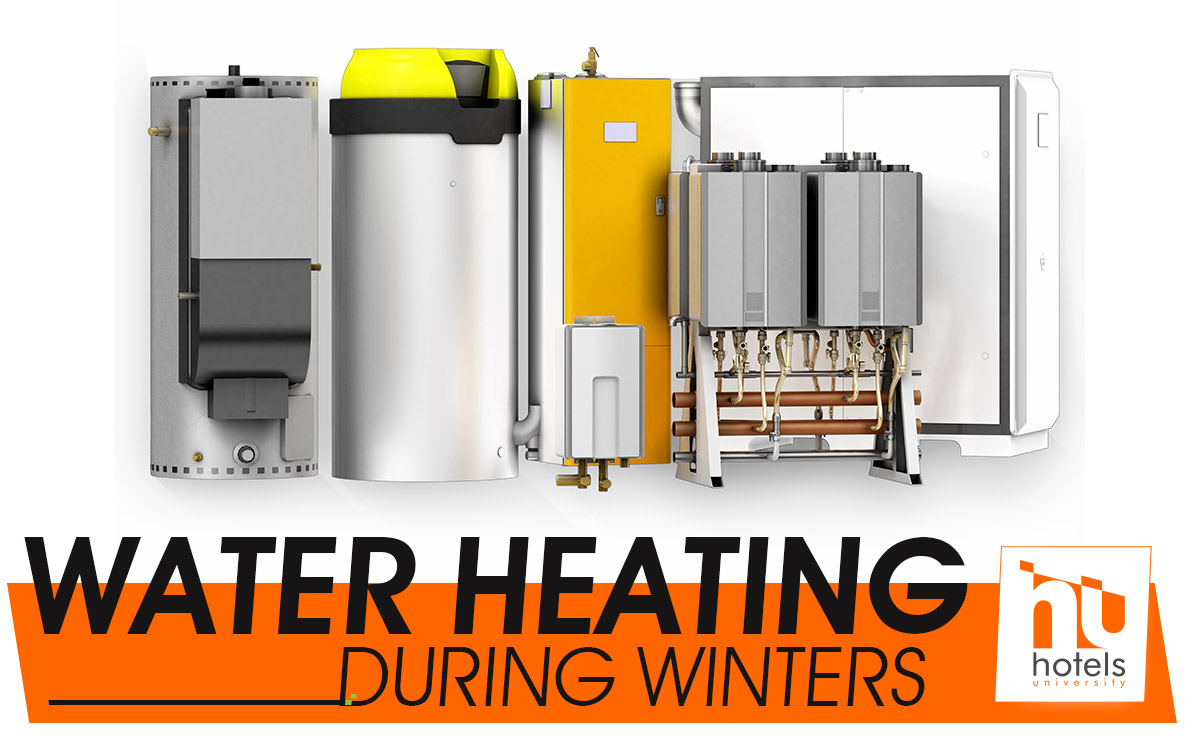


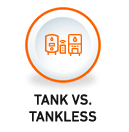



Leave A Comment